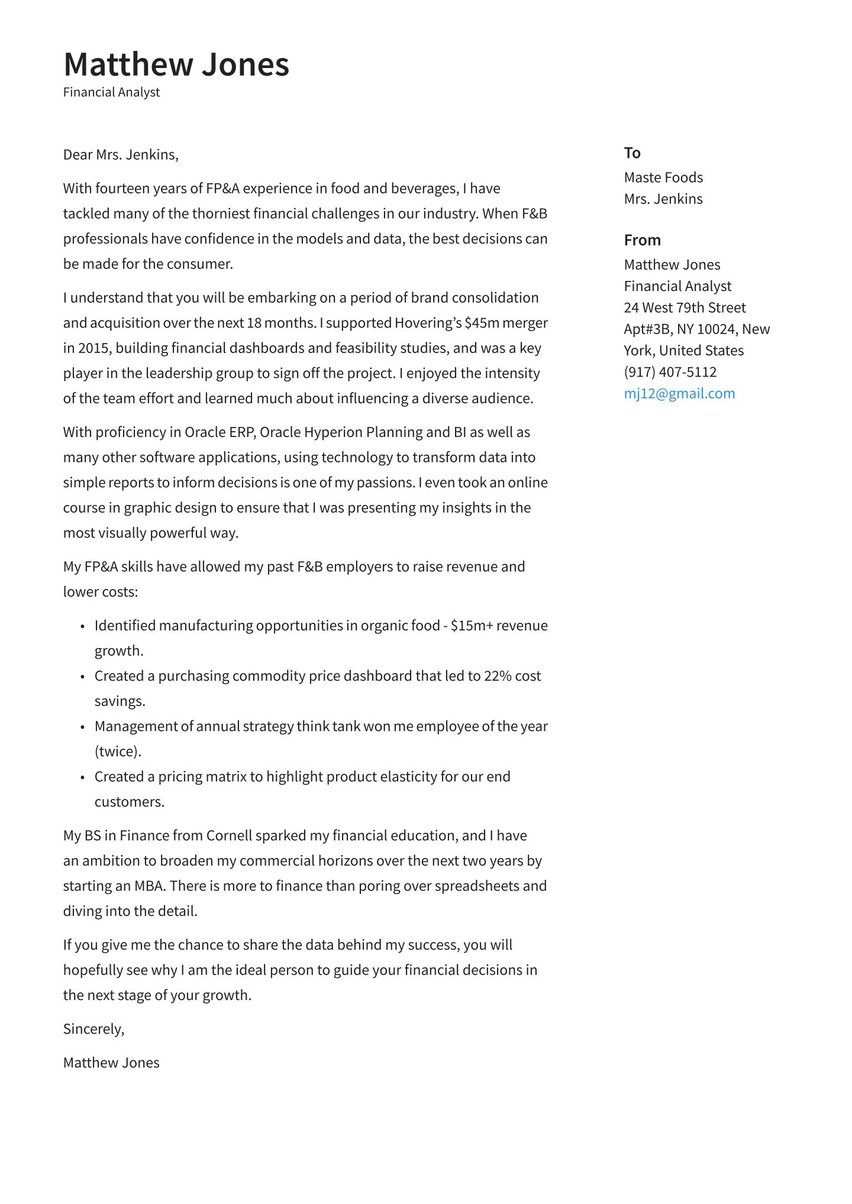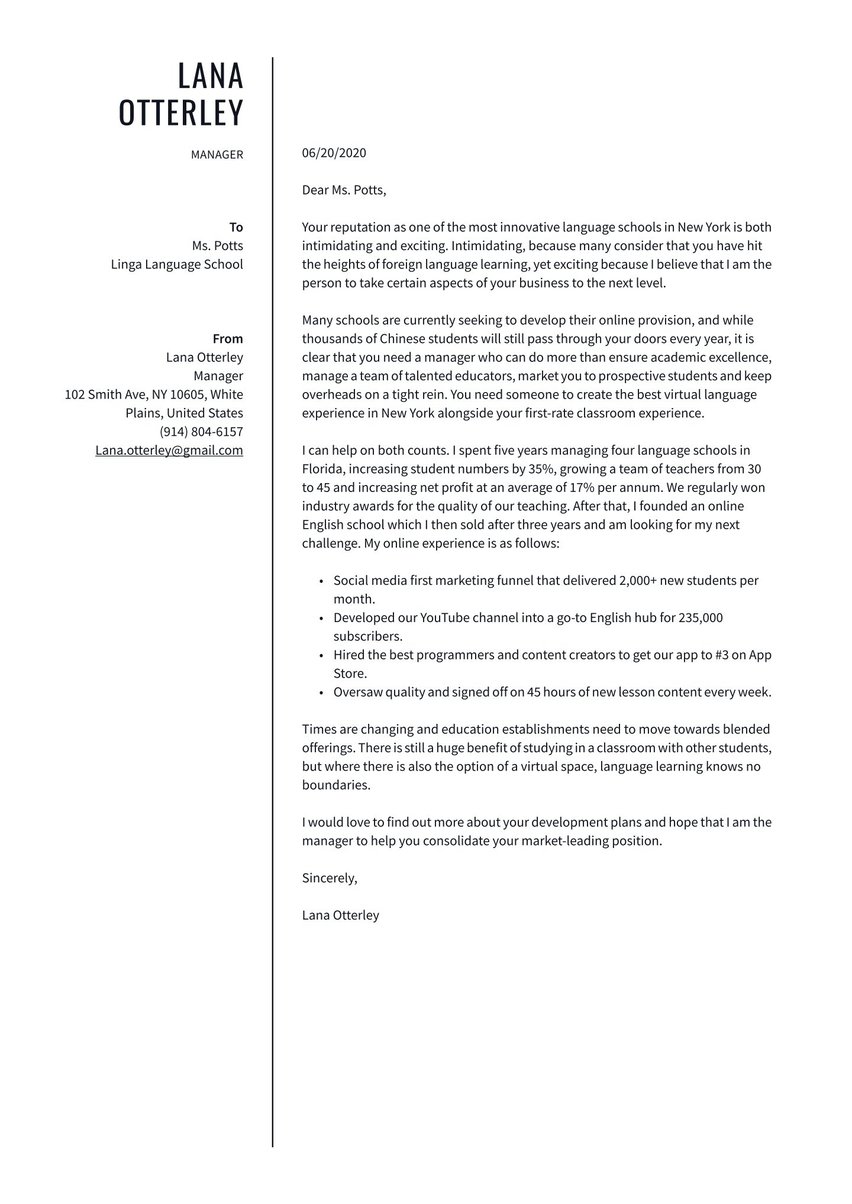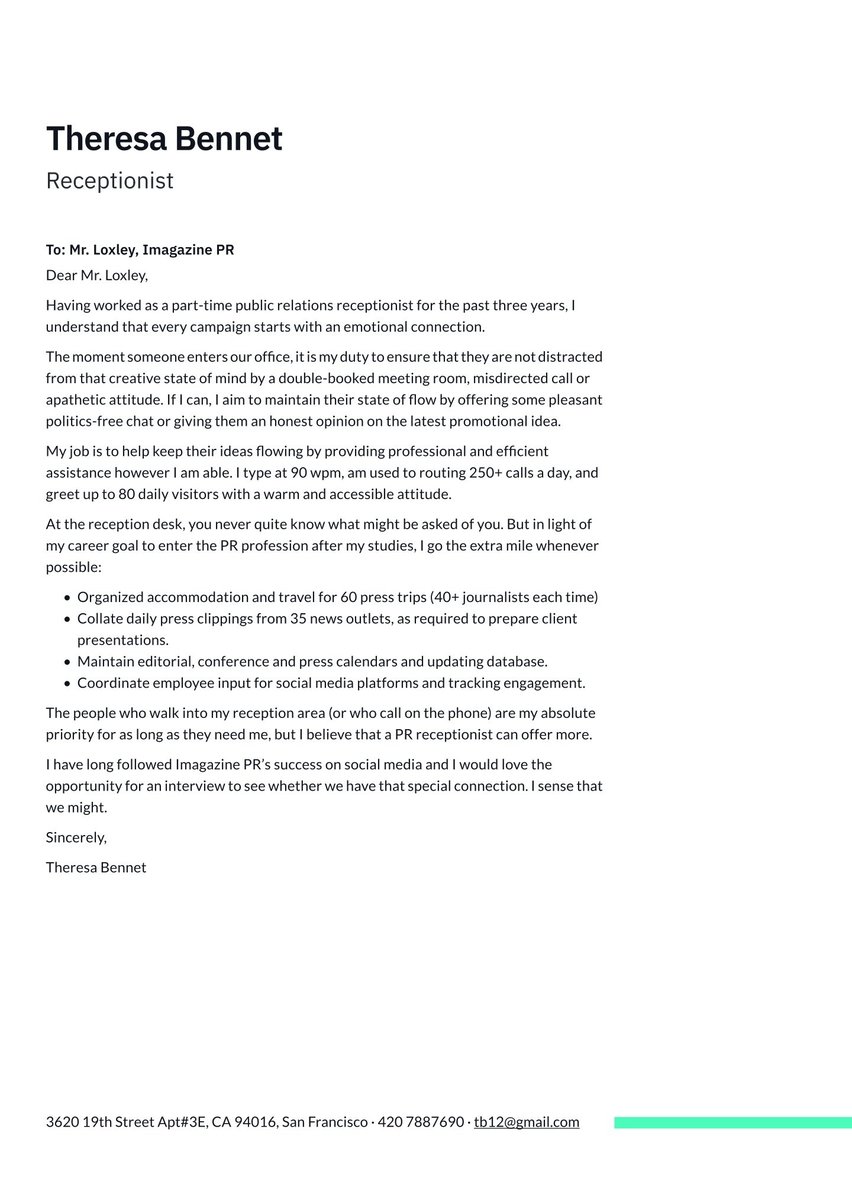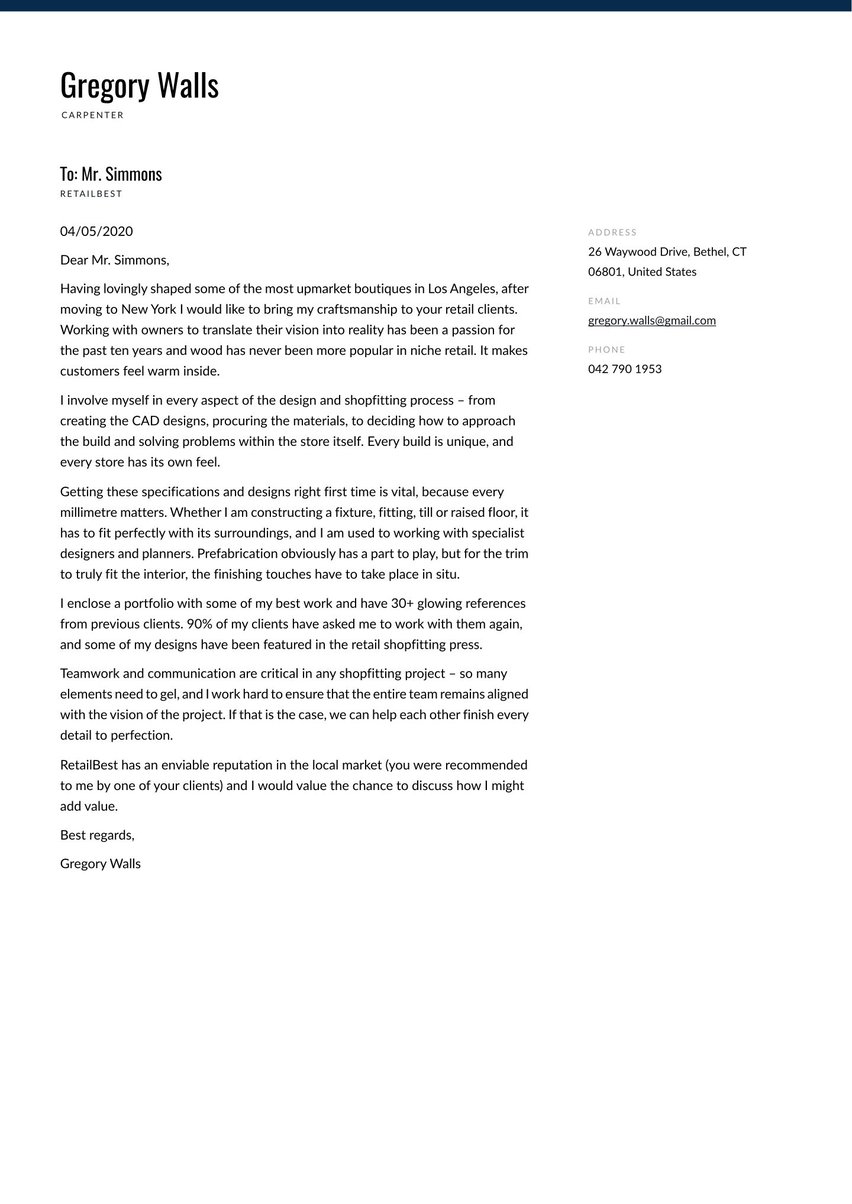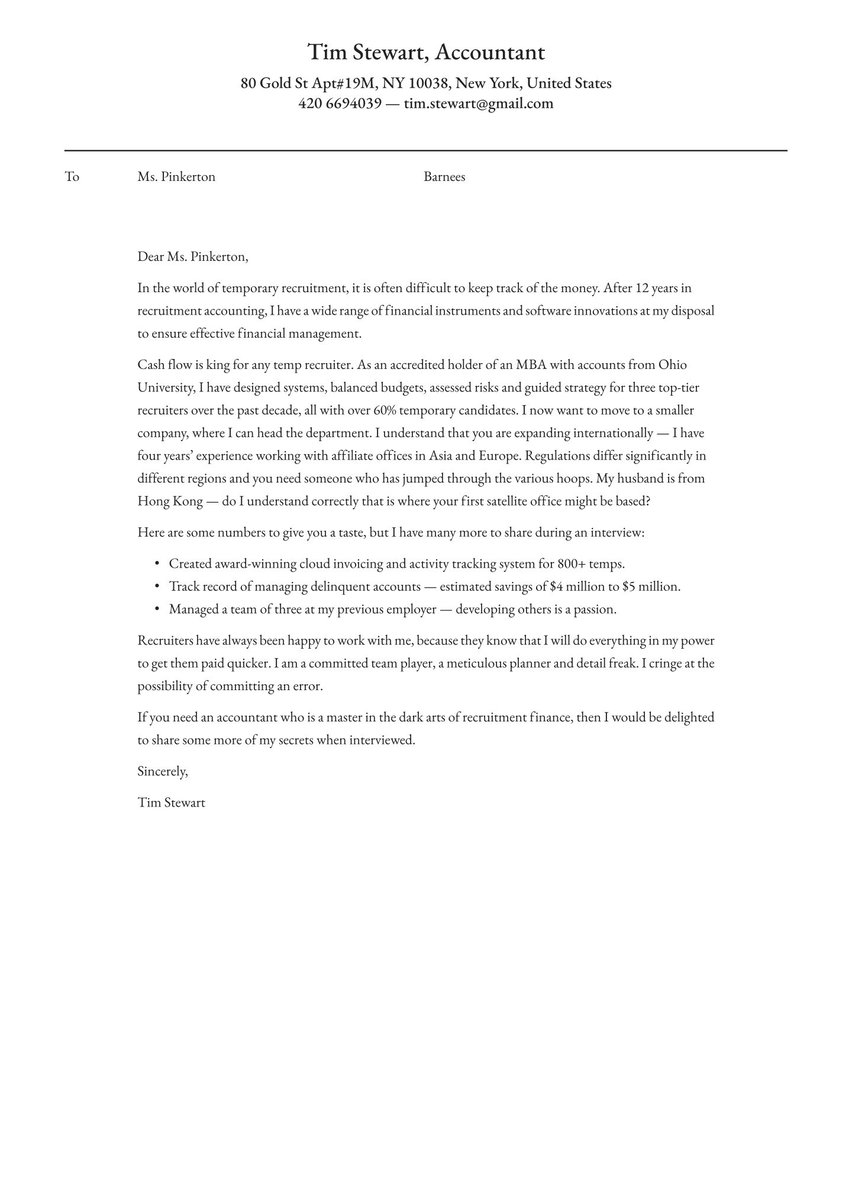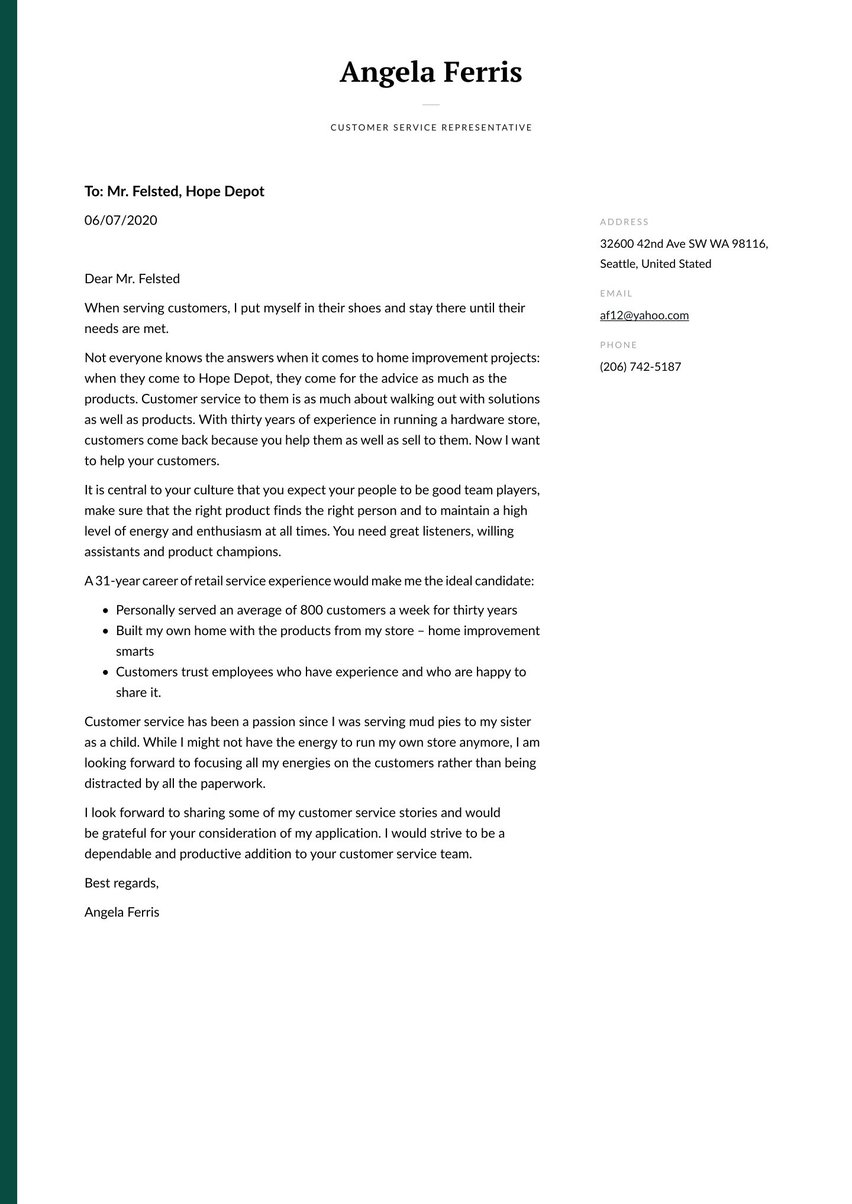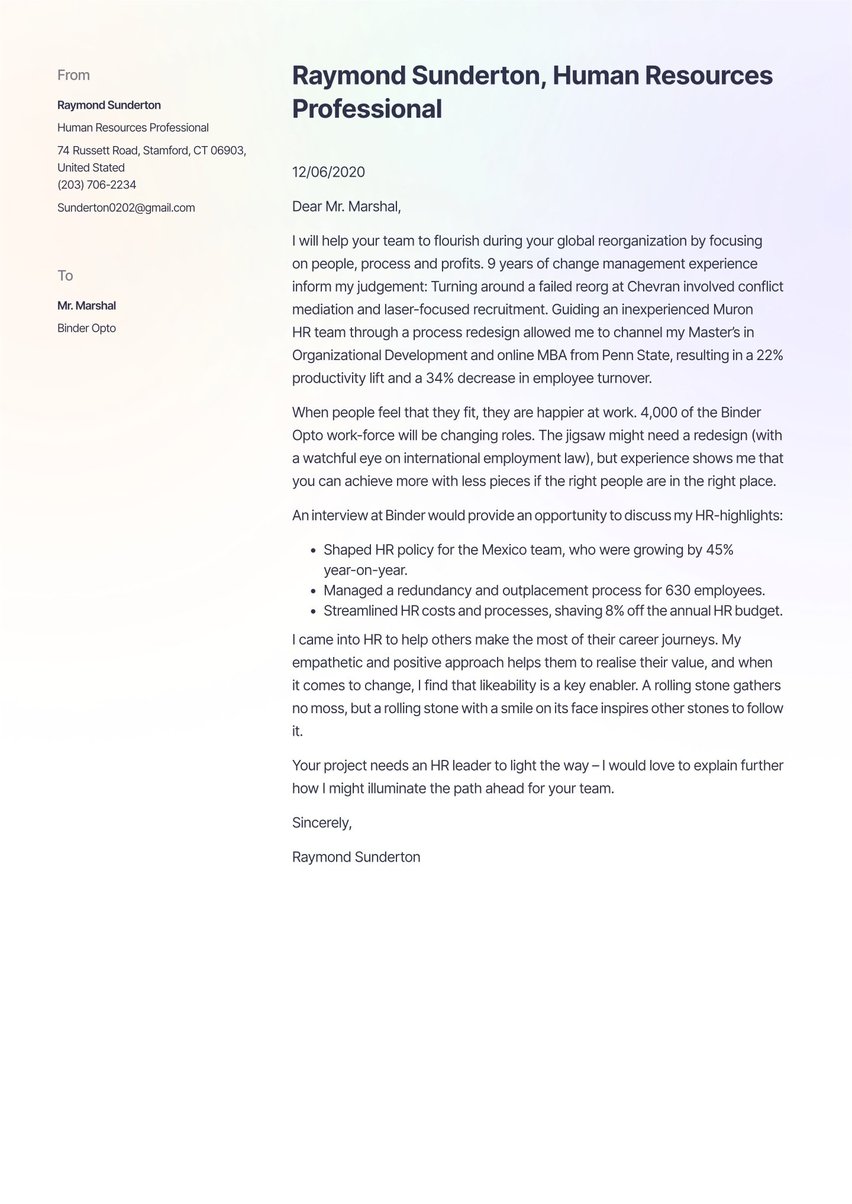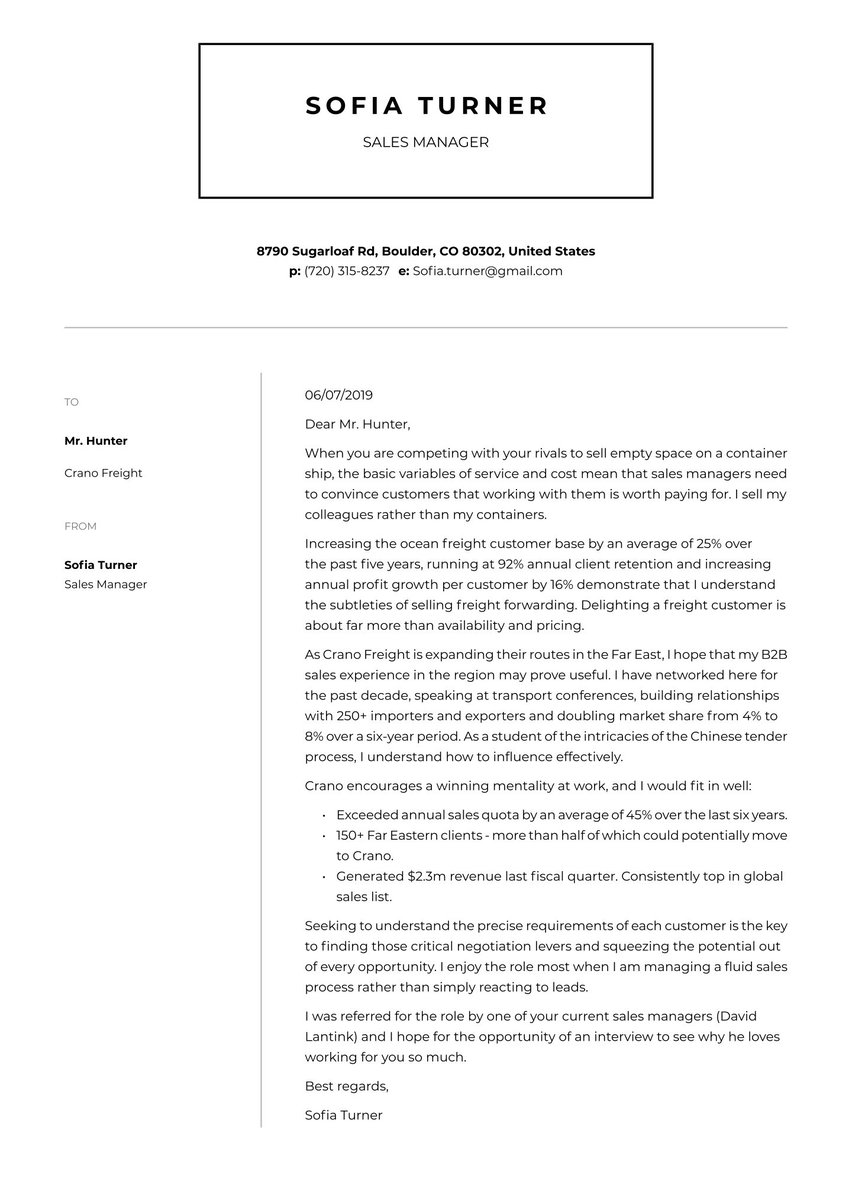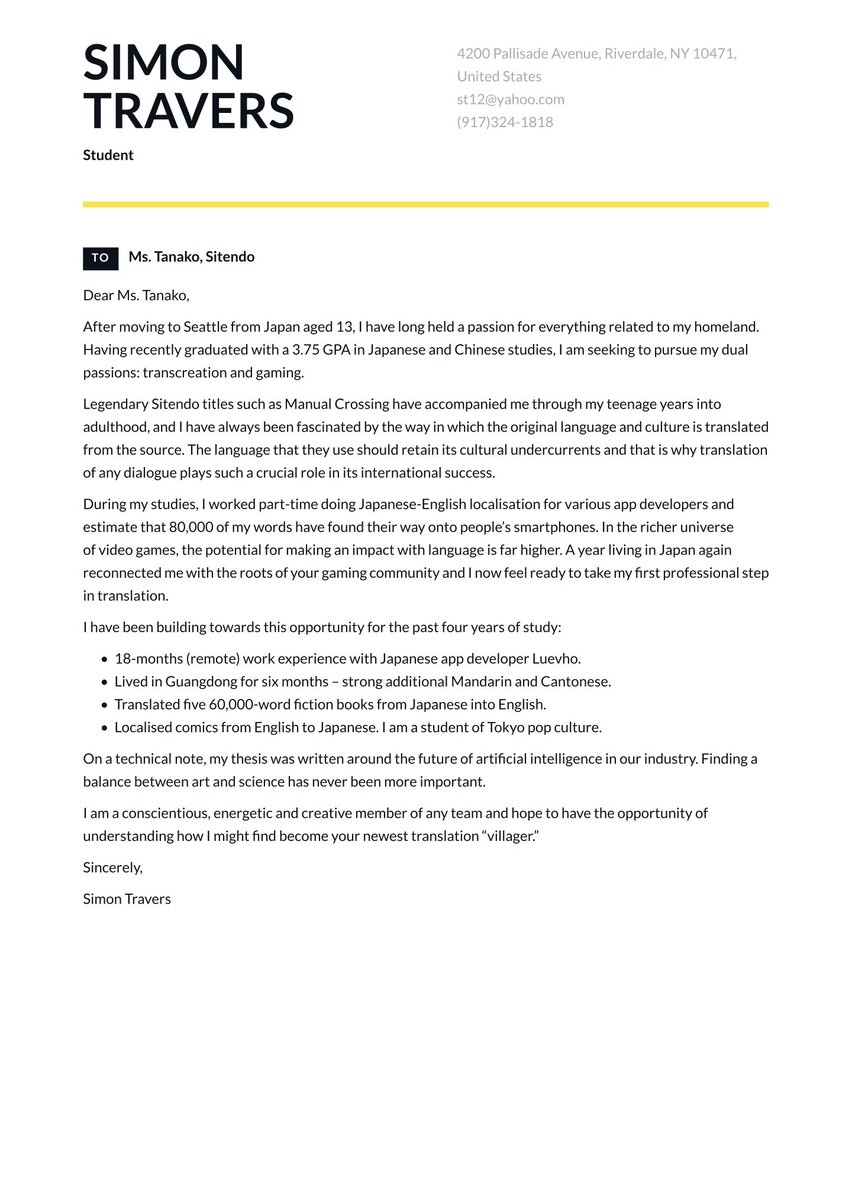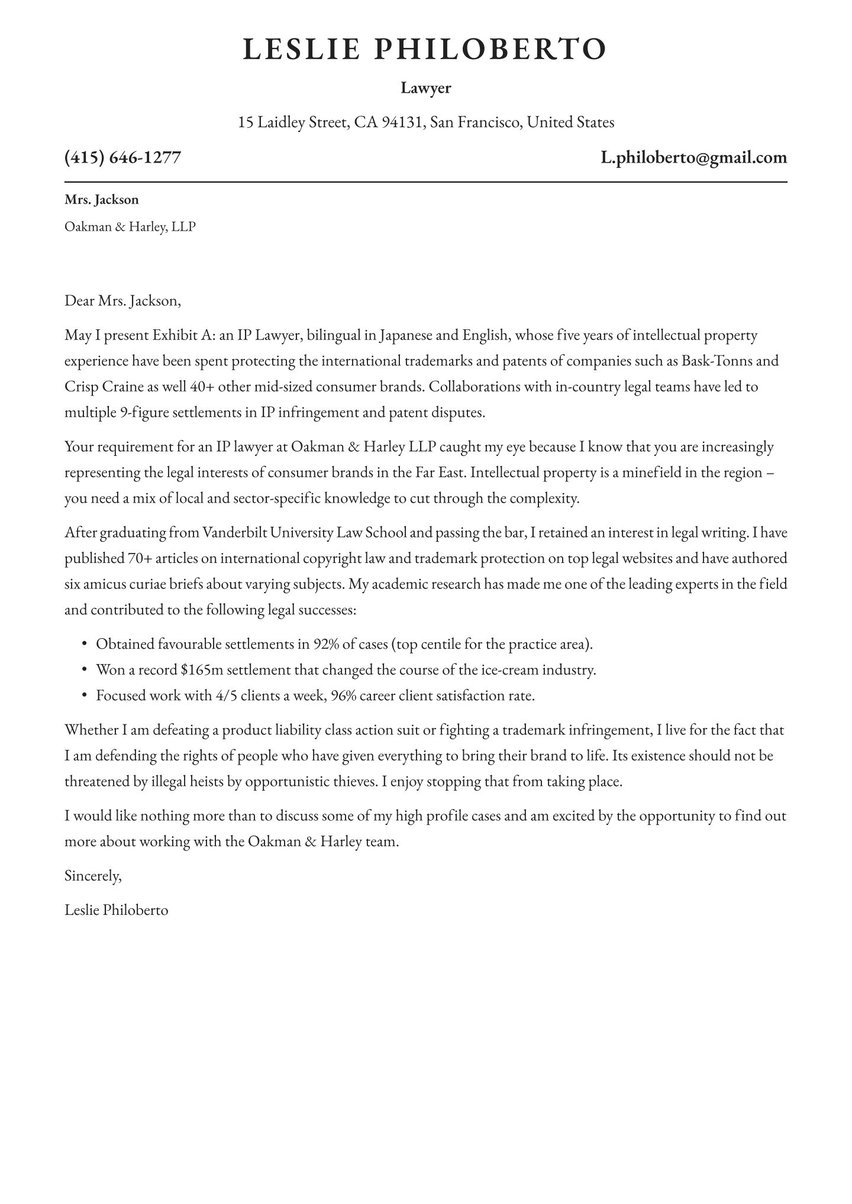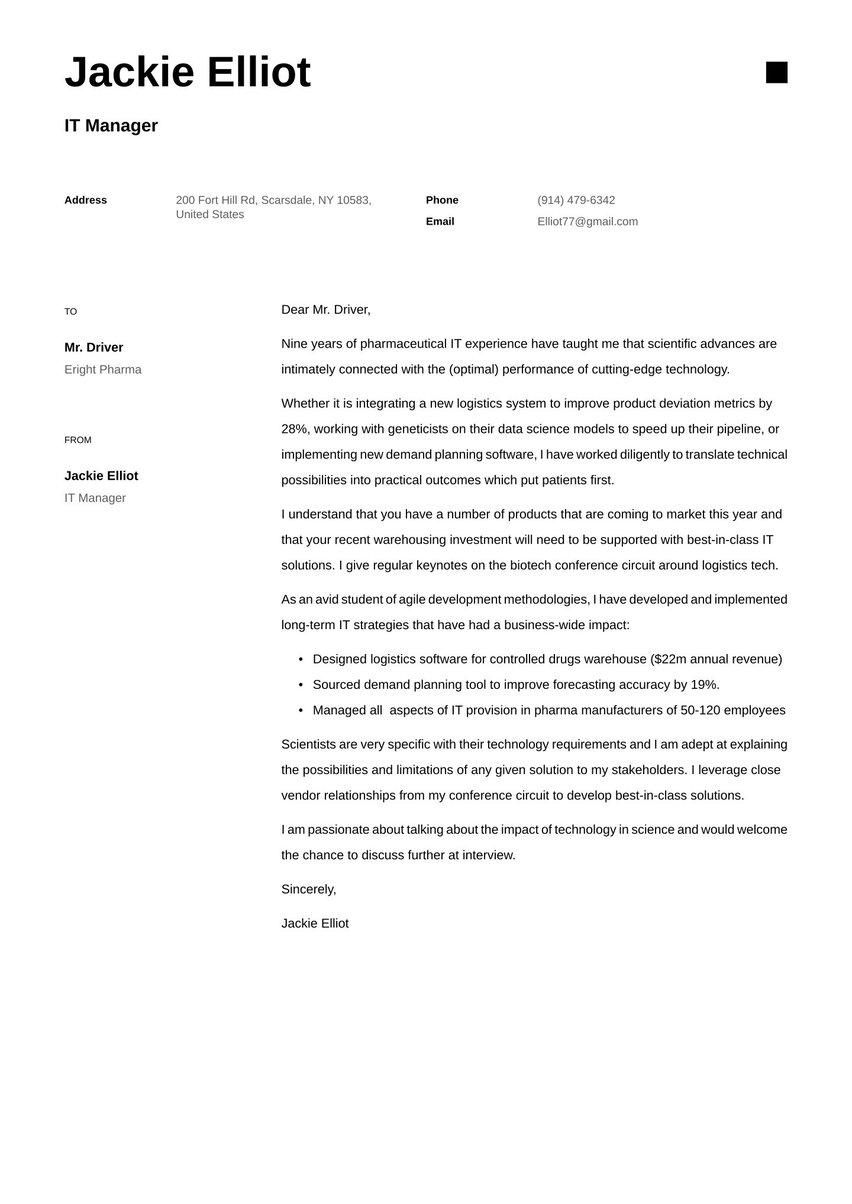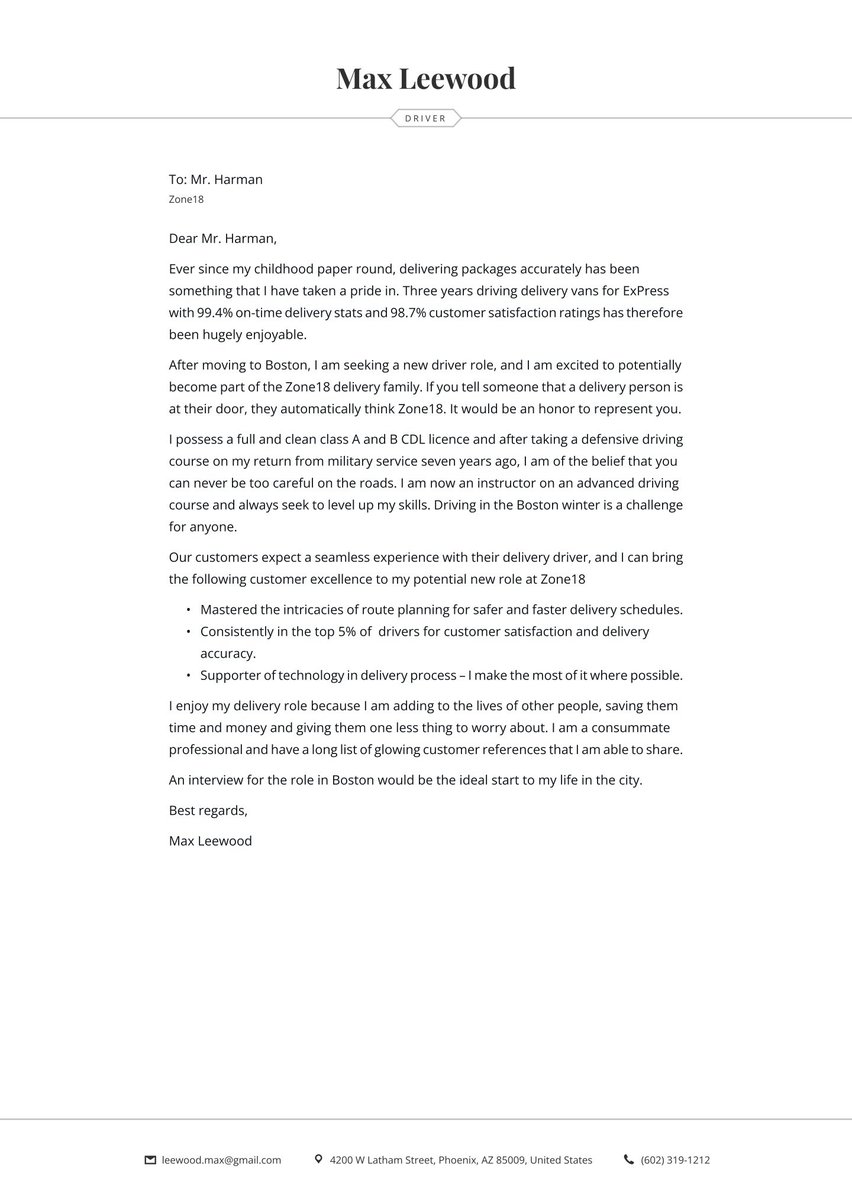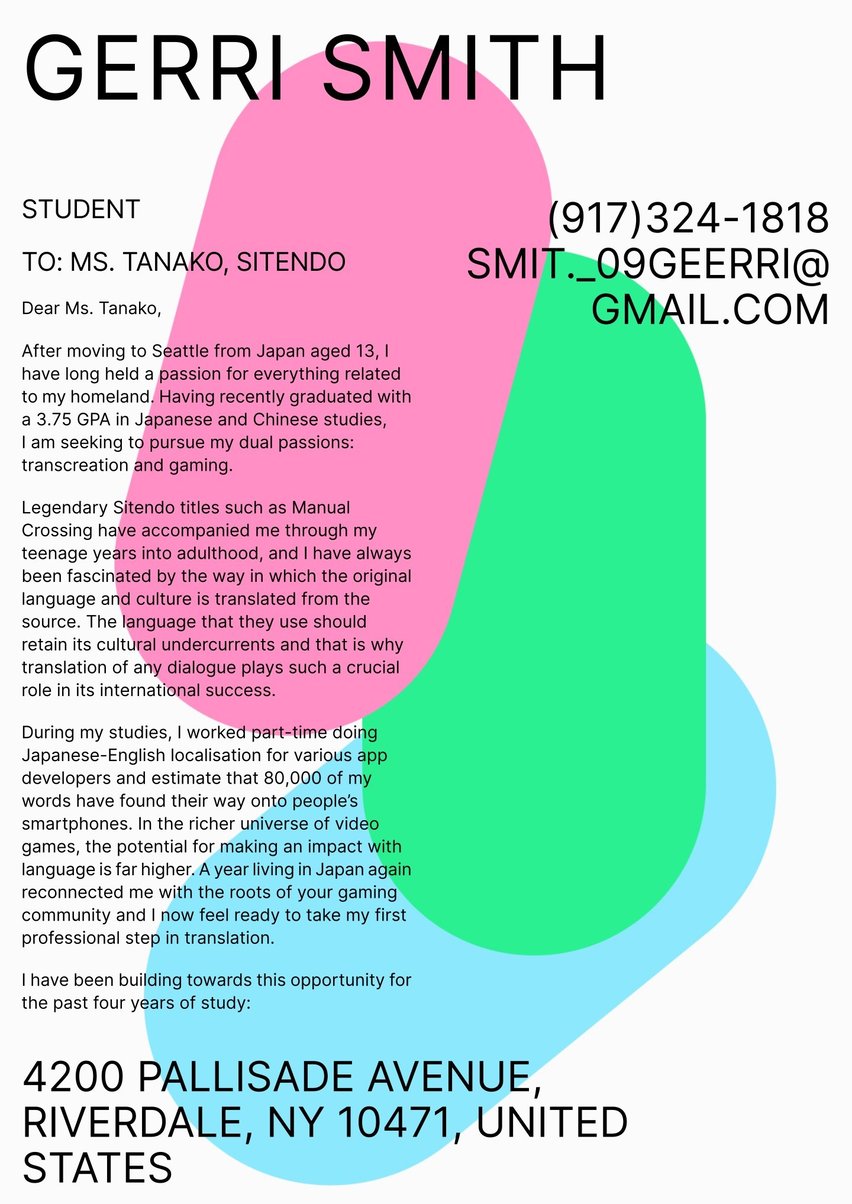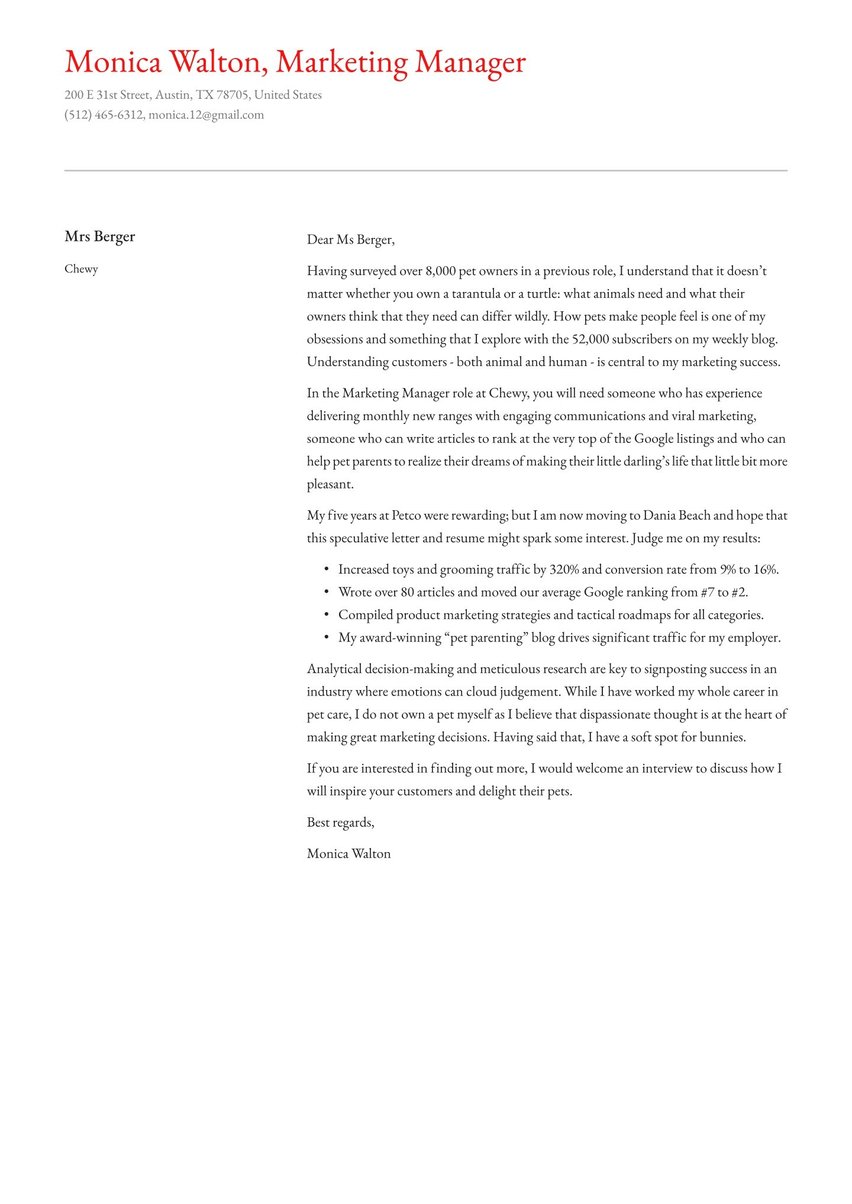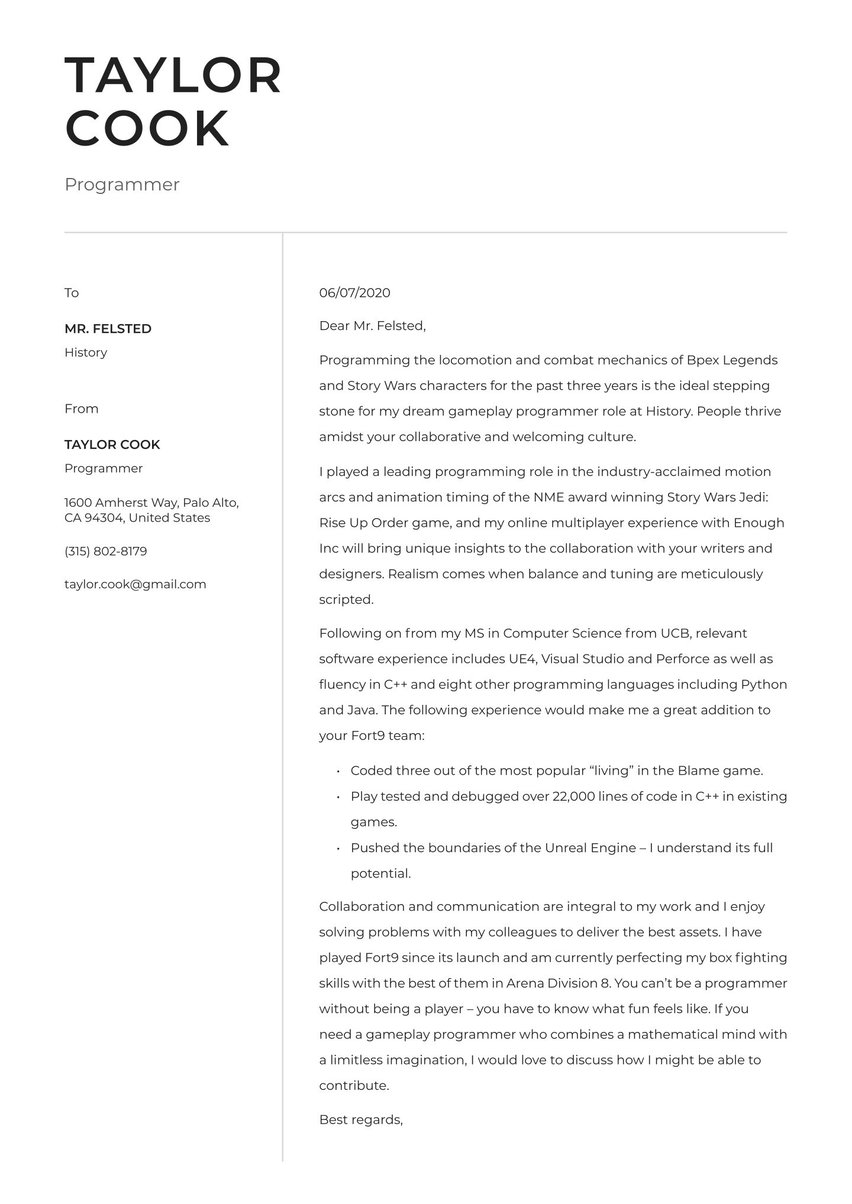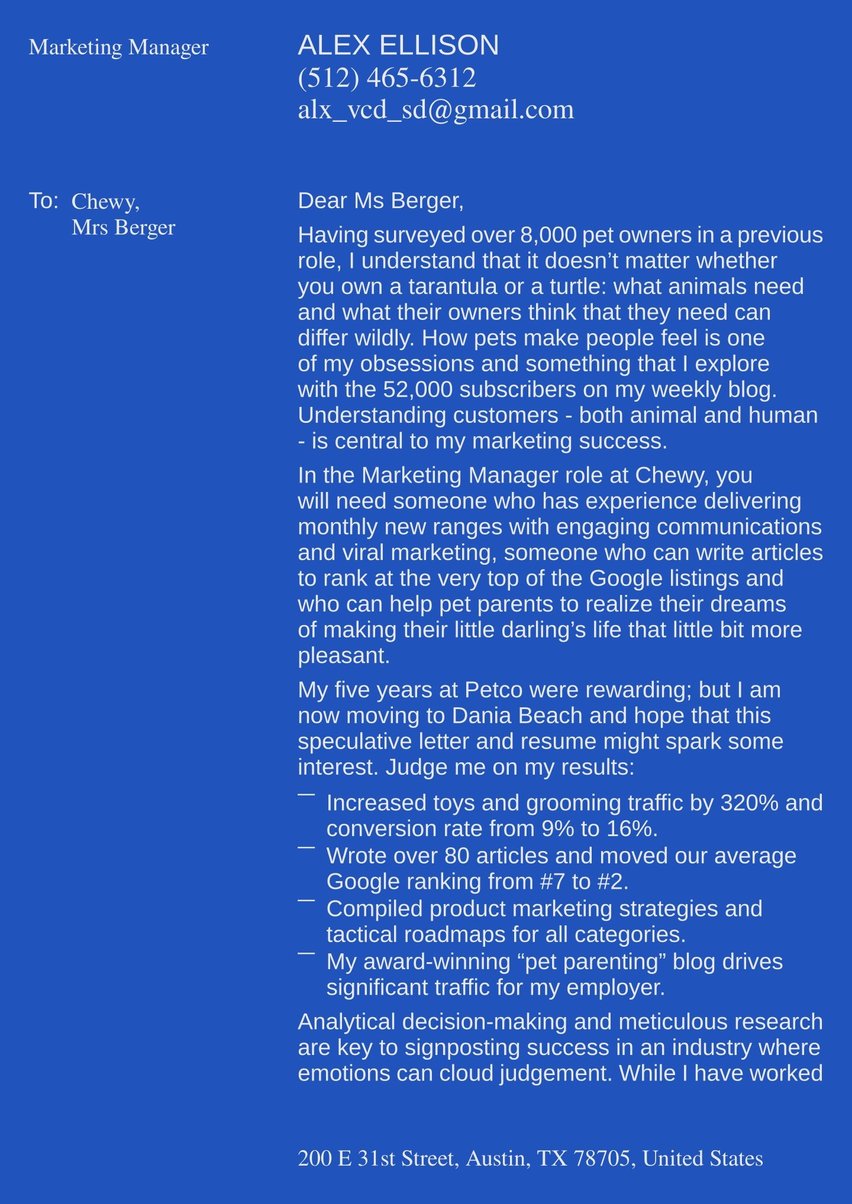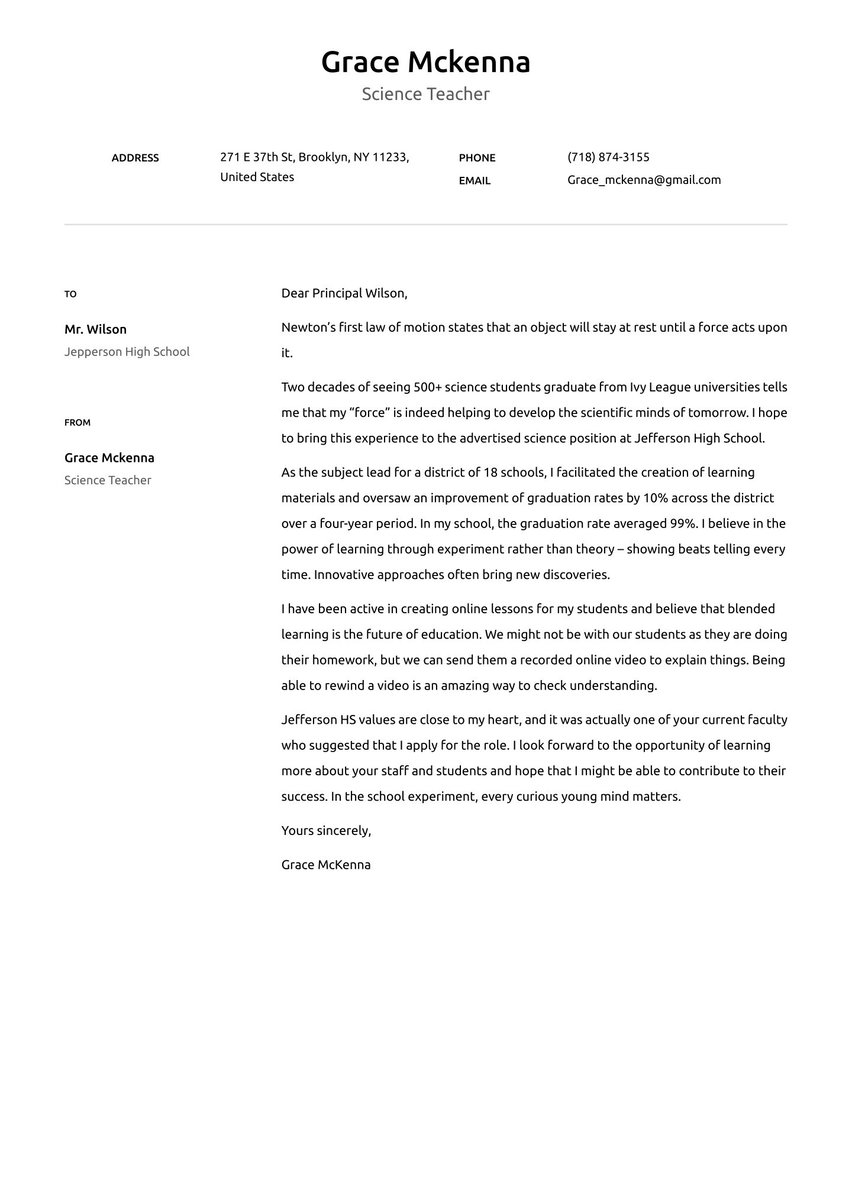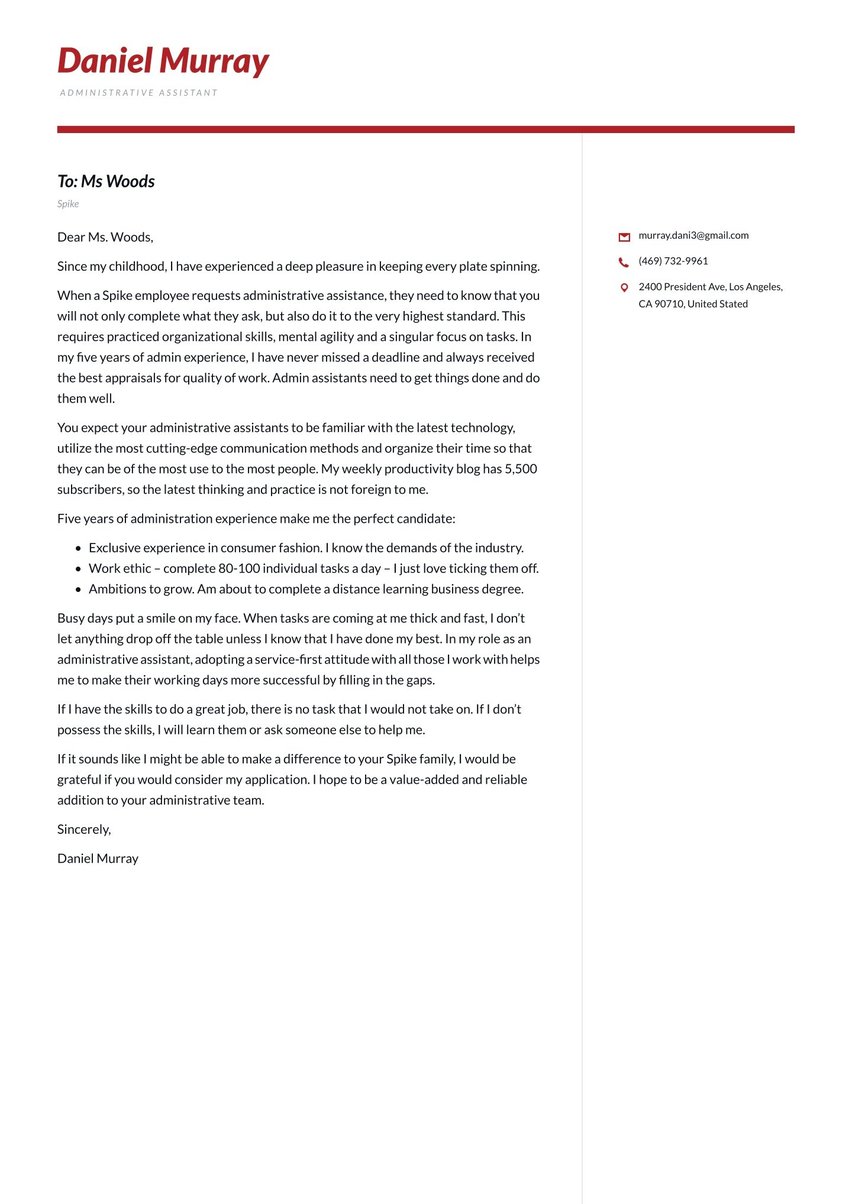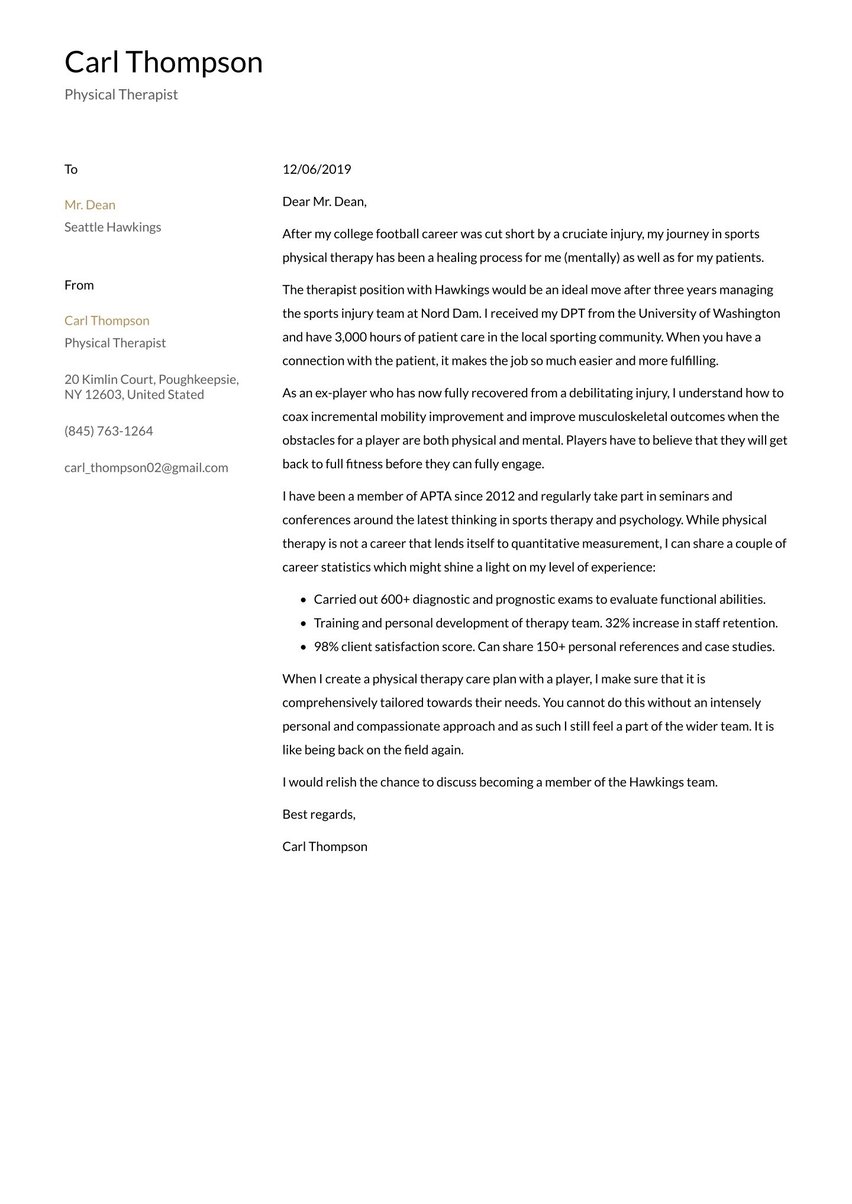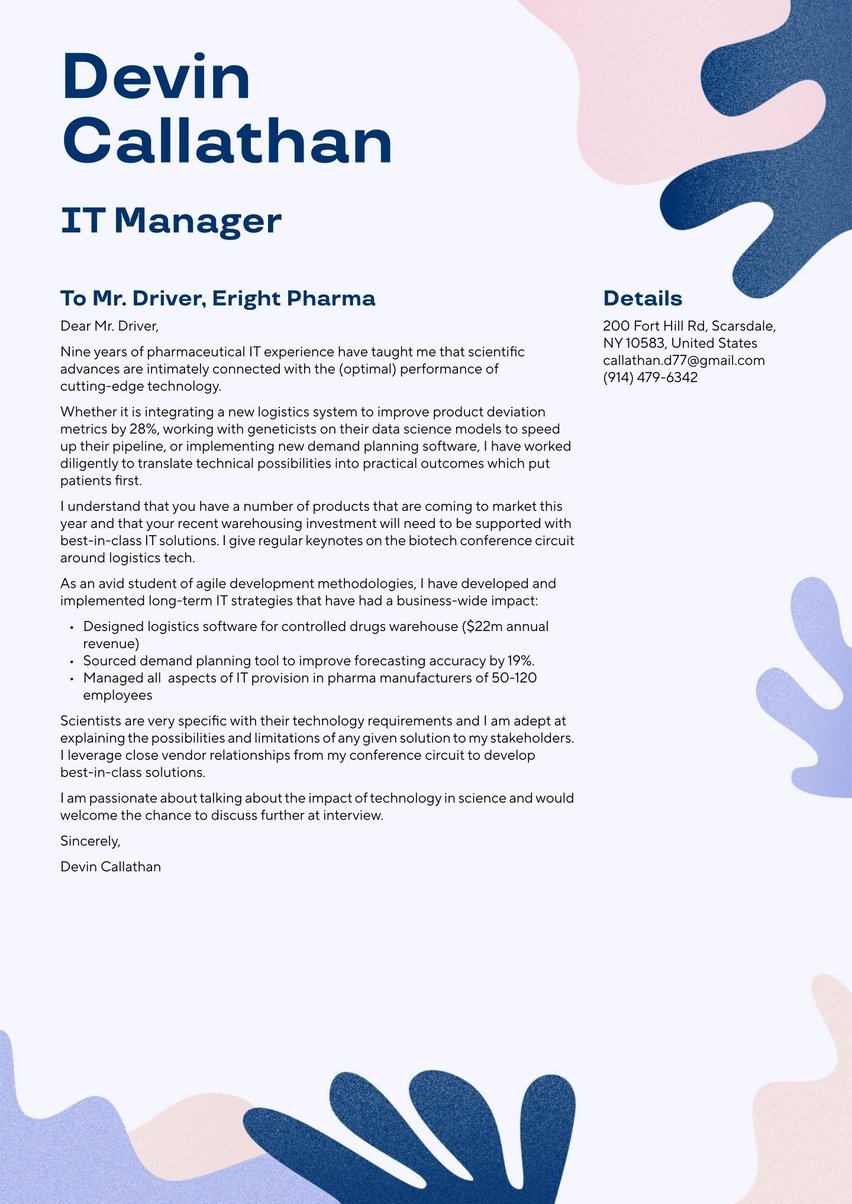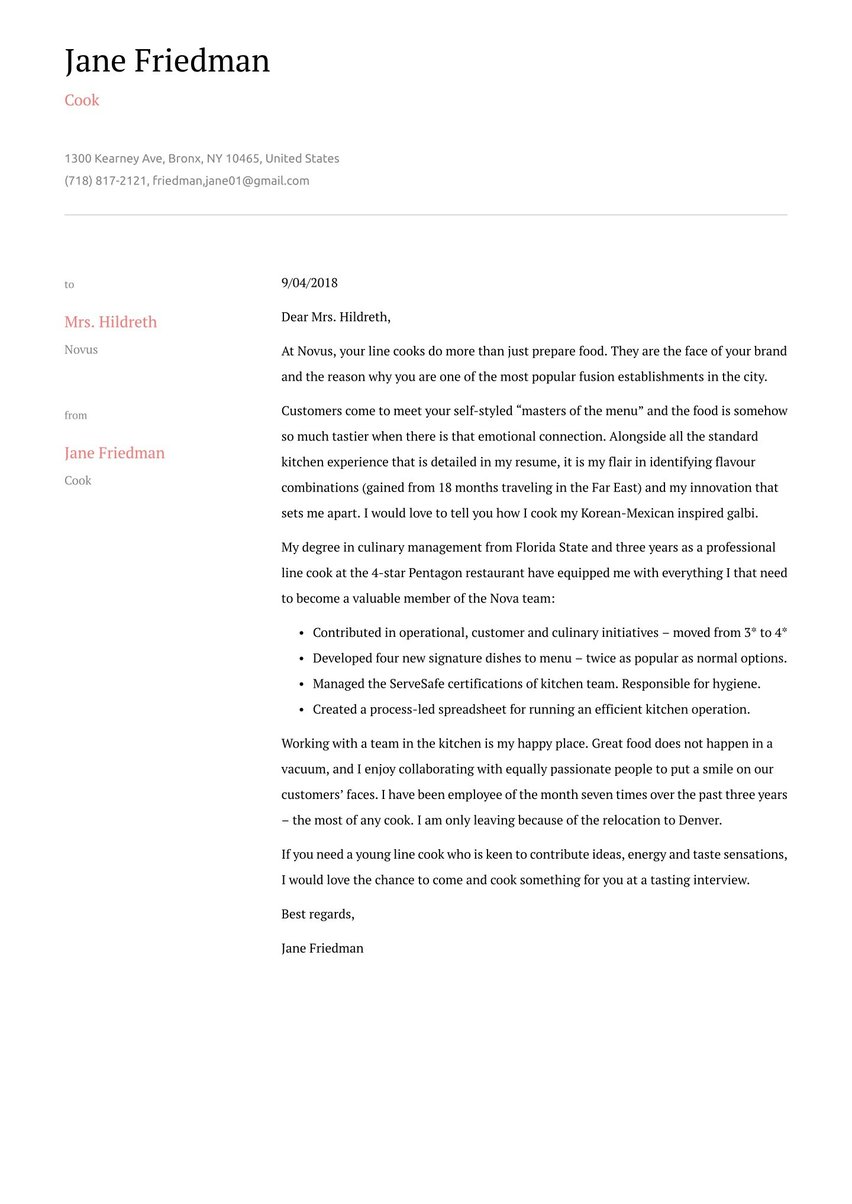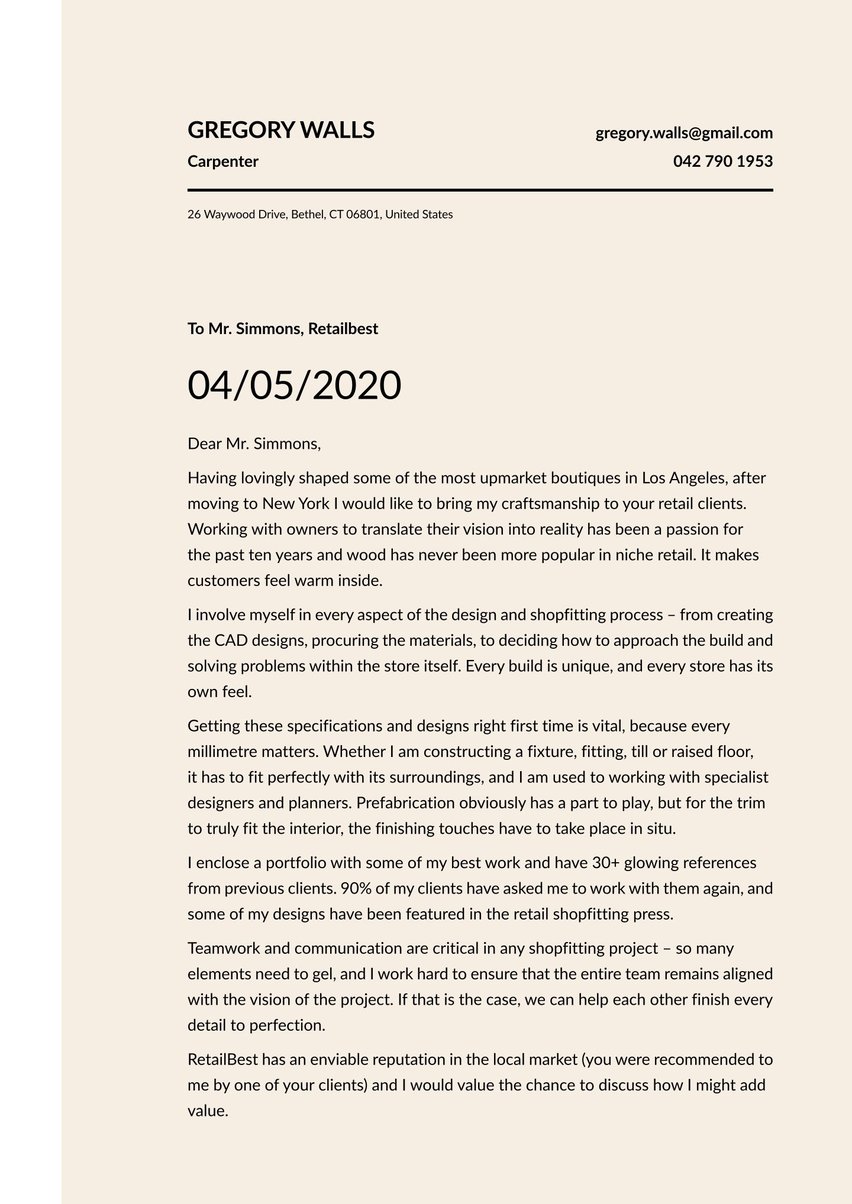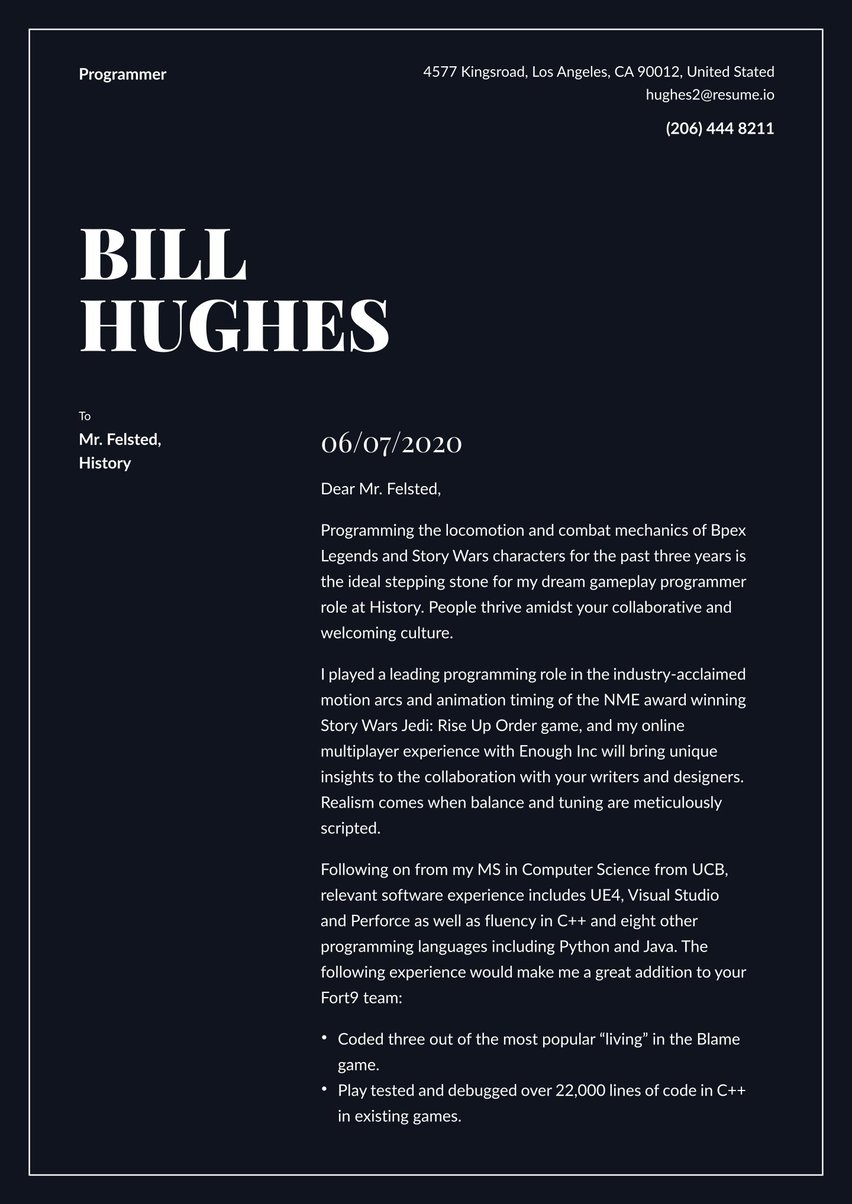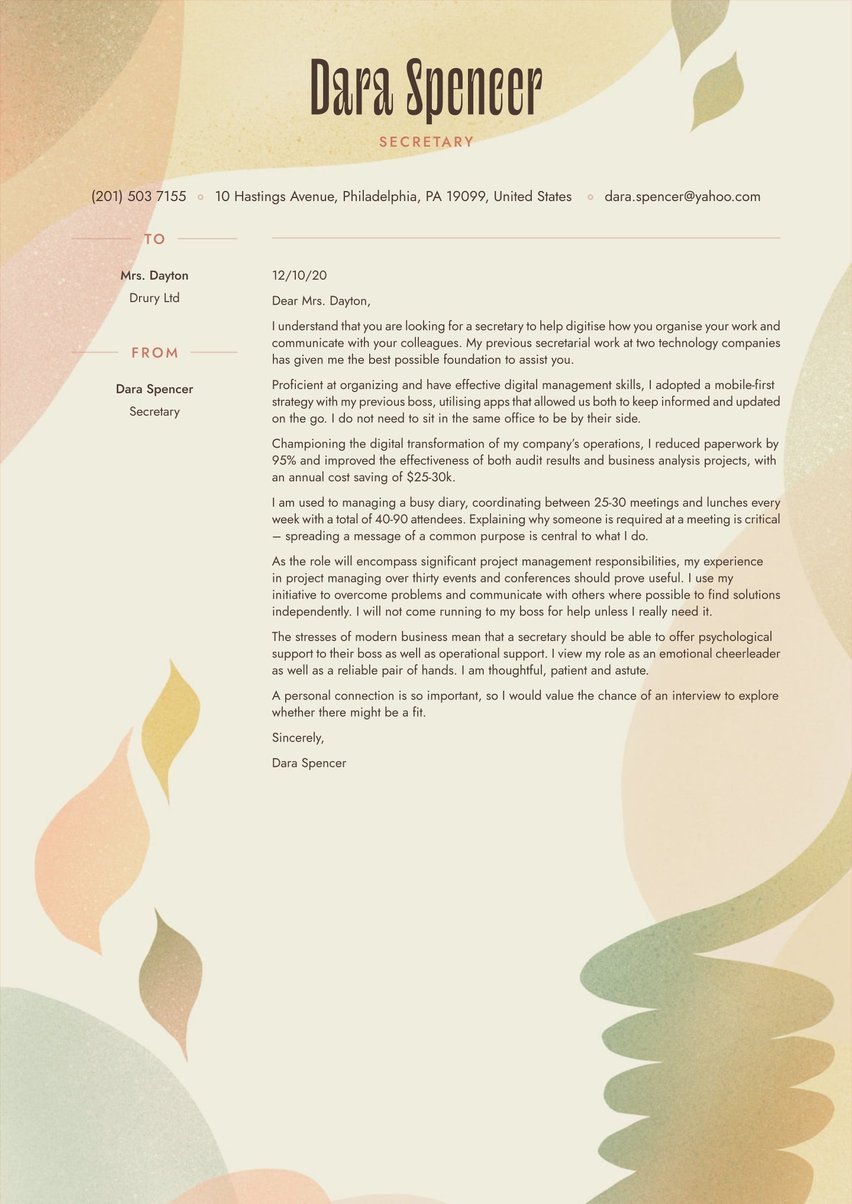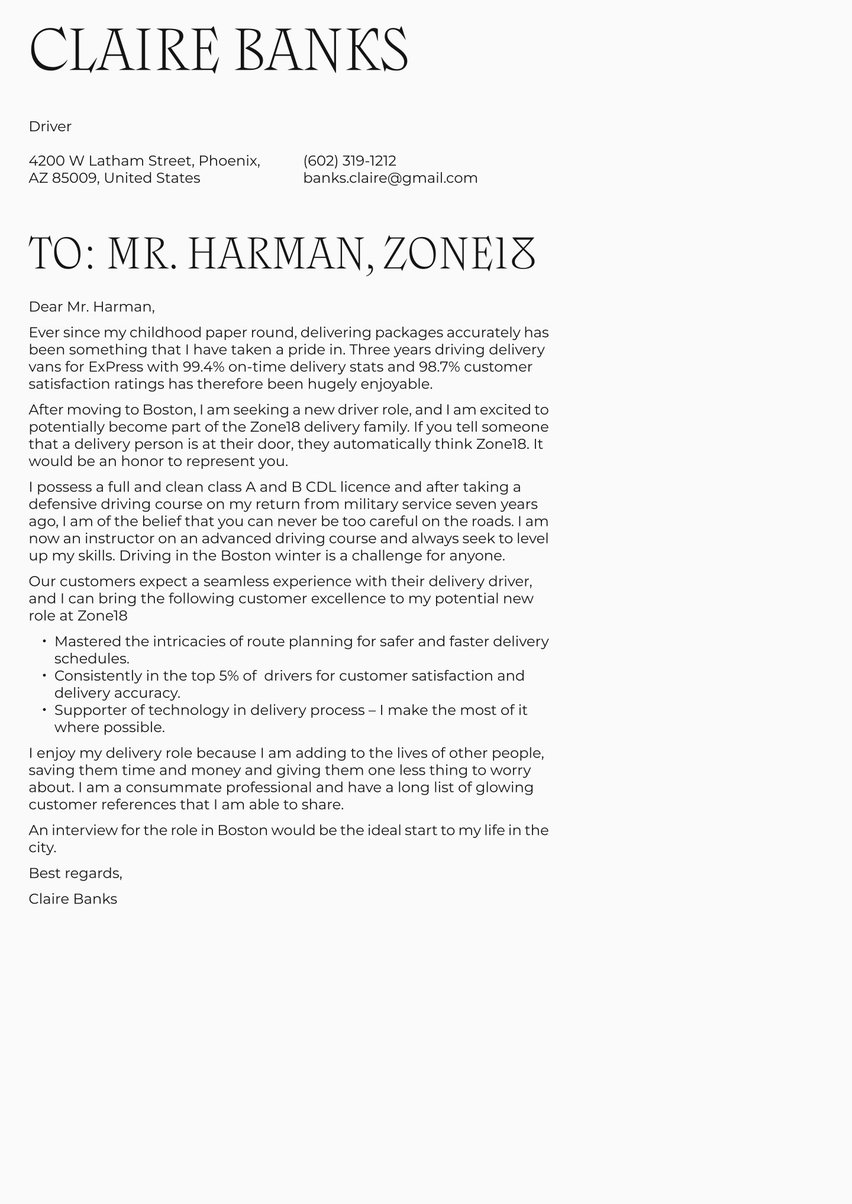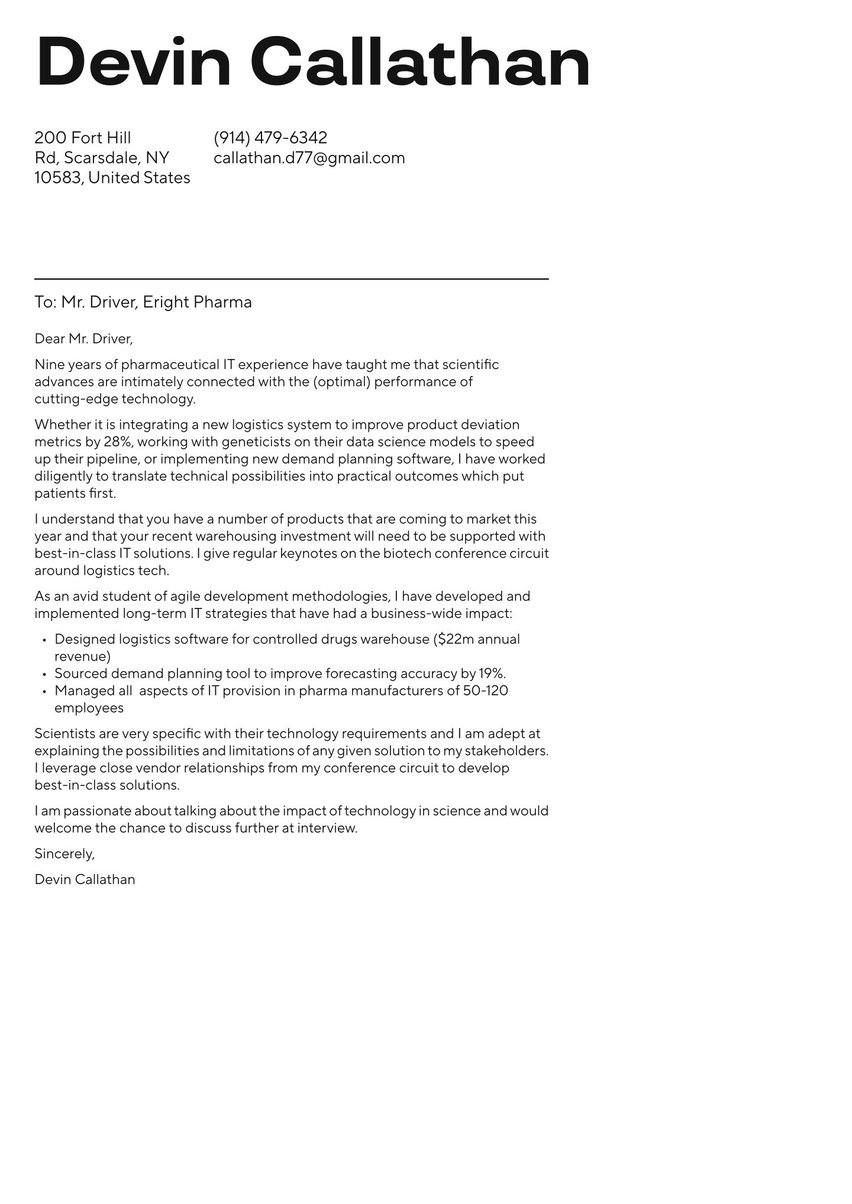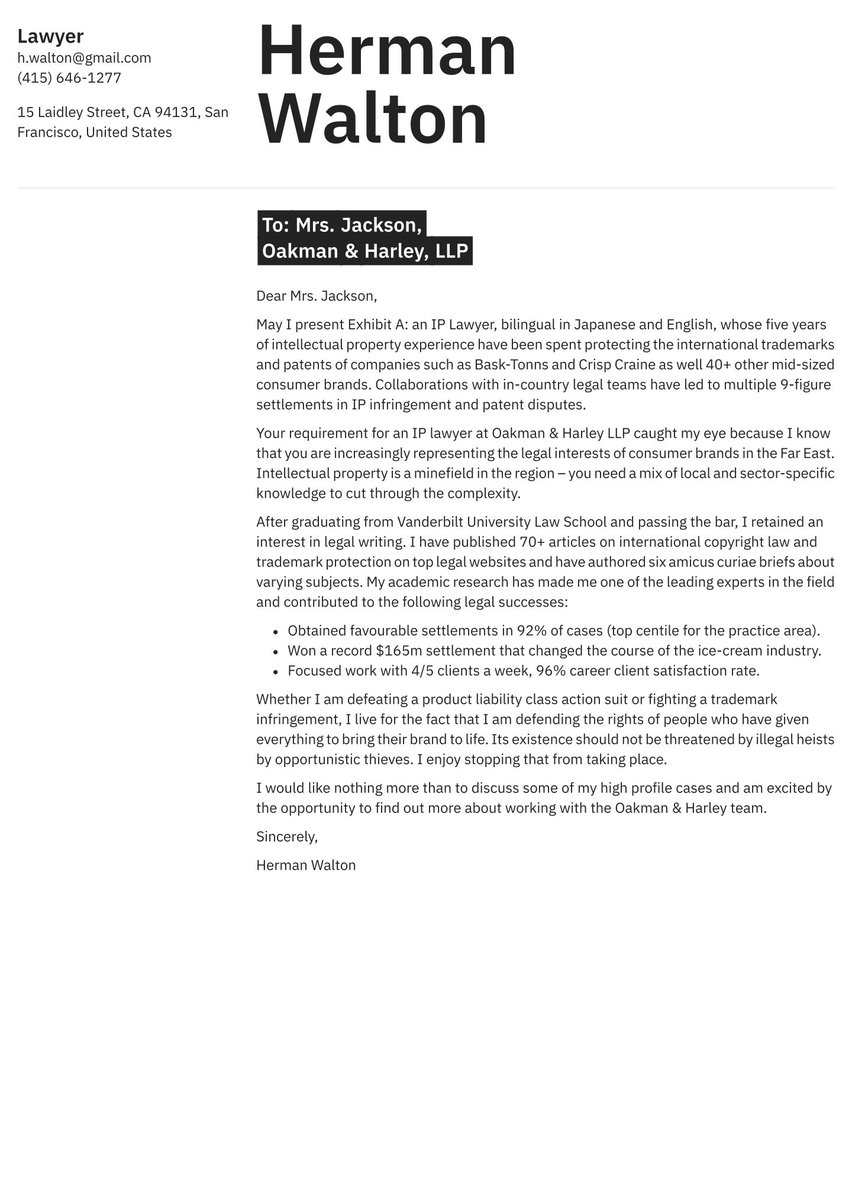Although pets are notoriously reluctant to visit them, veterinarians keep our dogs, cats and other animals healthy, vaccinated and spayed or neutered. If this is your field, writing a standout veterinary cover letter is an essential step to getting your next job.
The advice in this writing guide is paired with a veterinary cover letter example that can be modified for your own use. What we’ll cover:
- The correct format for structuring your veterinary cover letter
- Persuasive pointers for each section of your veterinary cover letter: header, greeting, introduction, body and conclusion
- Avoiding common cover letter mistakes
For more cover letter writing and formatting tips, take a moment to review some of Resume.io’s 180+ other cover letter examples.
Additional cover letter examples and writing guides for medical occupations can be found here:
- Caregiver cover letter sample
- Physical therapist cover letter sample
- Lab technician cover letter sample
- Doctor cover letter sample
- Occupational therapy cover letter sample
- Pharmacy technician cover letter sample
- Pharmacy assistant cover letter sample
- CNA cover letter sample
- Healthcare cover letter sample
- Medical cover letter sample
- Physician assistant cover letter sample
- Veterinary assistant cover letter sample
- Doctor assistant cover letter sample
- Phlebotomist cover letter sample
- Carer cover letter sample
- Medical assistant cover letter sample
- Lab assistant cover letter sample
Best format for a veterinary cover letter
Like all cover letters, the one you write as part of your veterinary job application should be structured to include these essential sections:
- Header
- Greeting
- Introduction
- Body
- Conclusion
- Sign-off and signature
Harried vet hiring managers will appreciate the favor of you sticking to these simple cover letter ground rules.
- Tailor to a tee. Every cover letter must fit the employer’s specific hiring needs.
- Less is more. A power-packed cover letter can still be short — never more than 400 words on one page.
- Pay close attention to the design and layout of your veterinary cover letter, making sure it has a professional, eye-pleasing look, with appropriate use of fonts, margins, and white space. Do not use a tiny font size to try to cram a wordy letter onto one page.
- Strive for a balanced look, avoiding a page layout that is full of text at the top and blank at the bottom. Keep your paragraphs of more or less equal length, and avoid big blocks of unbroken text.
Our comprehensive cover letter writing guide contains more detailed advice for writing and formatting your veterinary cover letter.
Our writing tips for each separate part of your cover letter will refer to the veterinary cover letter sample below, which you can modify.
Dear Dr. Winsome,
As a veterinarian with six years of reptile care experience, I believe my specialization and commitment to care standards for even the smallest animals would add to the Holt Clinic’s outstanding reputation in the field.
My veterinary career has brought experience in diagnosing, treating and performing surgery on all major household pets. Much of my experience is with dogs, cats and rabbits, although I have a particular affinity for snakes and reptiles. Your state-of-the-art reptile care facility is a key reason for my interest in the role.
For the past six years, I have spent my summers volunteering in the reptile house of the Fort Worth Zoo to help the veterinary team tackle its most difficult cases. Whether the issues are caused by improper enclosure temperatures, Vitamin A deficiency or respiratory problems, much of my time is spent educating as well as treating.
While surgery for reptiles is rare, I have performed an average of 20 procedures a month on a variety of animals, and am an expert in the latest surgical techniques. My success rate of 96 percent was higher than the state average of 84 percent. I always make an effort to engage with owners before their pet goes into surgery to explain why we are taking action and patiently answer any questions. I find that once owners better understand their pets, they are much less likely to bring the animal in for a recurrence of common issues.
More than 40 letters of recommendation from clients and pet owners attest to my expertise, experience, and passion for the career I chose. I hope for the opportunity to visit your clinic to discuss how my skills might add to your renowned reptile veterinary team.
Sincerely,
Simona Jakes
Cover letter header: How to reach you
A distinctive cover letter header visually sets you apart from other job contenders in a professional “brand” sense. As a modern version of what used to be the typed letterhead portion of correspondence in pre-digital times, the header prominently displays your identifying details to eye-pleasing effect: your name, profession, phone number, and email. Add links to your LinkedIn profile, website and any other professionally relevant online information or social media.
Have you produced, or been featured as an expert source, in any YouTube videos on animal care topics? Written any web blogs? Be sure to add an online portfolio link in your cover letter header.
A well-designed header will automatically make your cover letter text look more professional and inviting to read by creating white space in between. Double the impact with matching headers on your resume and cover letter. Then it’s obvious both documents belong to you, and your contact information is easy for duly impressed recruiters to find later when inviting you for an interview.
Goal of the cover letter header: Acts as a branding element to create a memorable first impression when recruiters are drawn to your identifying information.
Cover letter greeting
The cover letter greeting, also known as a salutation, should usually start with the word “Dear,” followed by “Mr.,” “Ms.” or “Dr.” and the hiring manager's last name of the hiring manager.
Always try to find out the actual name of the person processing job applications for the veterinary position job you’re seeking. In all likelihood, that won't be difficult if it's a vet clinic position. It might take some sleuthing if the hiring organization is large — for instance, a government department or college faculty — or you are applying through a recruiting agency.
But if it's impossible to identify any individual to address by name in your cover letter, use a more generic salutation like “Dear Happy Pet Veterinary Clinic” or “Dear Veterinary Hiring Team,”
Goal of the cover letter greeting: Addressing the recipient by name sets the right professional and personal tone to form an immediate direct connection.
Cover letter introduction
This is where you lock the connection you just made in the greeting. Your cover letter introduction must grip the reader’s attention without letting go. By hitting just the high notes, these opening lines will compel further reading.
To make your cover letter introduction especially engaging and relatable, name the hiring organization and comment on something you find impressive or intriguing.
Confine your cover letter introduction to a few captivating statements, leading with your most impressive job qualifications, whether that’s your years of experience in the field, your education or something else. Cite talents, interests, motivations, and achievements that match what this employer needs. “This is what I can do for you” should be the basis for connecting your past animal health contributions to your future potential.
Goal of the cover letter introduction: Appeal to the employer’s hiring needs by stressing compatibility with your strengths and goals as a veterinarian.
Below is the greeting and introduction from our veterinary cover letter sample.
Dear Dr. Winsome,
As a veterinarian with six years of reptile care experience, I believe my specialization and commitment to care standards for even the smallest animals would add to the Holt Clinic’s outstanding reputation in the field.
Cover letter body
The central part of your cover letter, known as the body, should present the meat and potatoes of your case. It’s the recruiter’s reward for reading past the introduction and could help you secure a short list spot. This section usually focuses on work experience, though it may mention education and special skills as well.
Try to mention why you want to work for this employer in particular so it's obvious that you aren’t just e-blasting the same boilerplate cover letter to multiple employers.
Reinforce that you are thoroughly familiar with the target job requirements by incorporating tangible, relevant examples of your veterinary success stories. Quantify with facts and figures wherever possible when describing beneficial outcomes that are sure to resonate with your next employer. For instance, how many specialized procedures did you perform per week (or month), using which techniques or equipment, to achieve what success rate percentage on average? Is there a particularly difficult case you could mention as an example of overcoming challenges?
Goal of the cover letter body: Build the recruiter’s confidence in your ability to provide excellent veterinary care.
Check out the body section from our veterinary cover letter example below.
My veterinary career has brought experience in diagnosing, treating and performing surgery on all major household pets. Much of my experience is with dogs, cats and rabbits, although I have a particular affinity for snakes and reptiles. Your state-of-the-art reptile care facility is a key reason for my interest in the role.
For the past six years, I have spent my summers volunteering in the reptile house of the Fort Worth Zoo to help the veterinary team tackle its most difficult cases. Whether the issues are caused by improper enclosure temperatures, Vitamin A deficiency or respiratory problems, much of my time is spent educating as well as treating.
While surgery for reptiles is rare, I have performed an average of 20 procedures a month on a variety of animals, and am an expert in the latest surgical techniques. My success rate of 96 percent was higher than the state average of 84 percent. I always make an effort to engage with owners before their pet goes into surgery to explain why we are taking action and patiently answer any questions. I find that once owners better understand their pets, they are much less likely to bring the animal in for a recurrence of common issues.
How to close a veterinary cover letter: conclusion and sign-off
The conclusion of your cover letter — the final paragraph — is where you reiterate your interest in the veterinary job opportunity and why you are an ideal match. It should include a call to action in which you tell the hiring manager that you look forward to a response. Be sure your tone is not demanding or presumptuous, but do make it clear that you’d really like to follow up.
The sign-off, sometimes called a complimentary close, is the line that says “Sincerely,” “Best regards,” “All my best,” “Thanks so much” or the like. Add a space below this and type your full name.
Goal of the cover letter closing: End on a confident, upbeat note with a call to action implying some response from the hiring team is expected.
See our the conclusion of our veterinary cover letter sample below.
More than 40 letters of recommendation from clients and pet owners attest to my expertise, experience, and passion for the career I chose. I hope for the opportunity to visit your clinic to discuss how my skills might add to your renowned reptile veterinary team.
Sincerely,
Simona Jakes
Common cover letter mistakes to avoid
Being in a profession where life-or-death outcomes are at stake, you know more than most about the importance of mistake prevention on the job. That sets the bar especially high for avoiding preventable missteps in your job application documents. Particularly in your cover letter, which recruiters are likely to look at first, just one careless error could at best raise eyebrows, and at worst be a dealbreaker.
These are some of the most common cover letter mistakes to avoid.
- Typos, misspellings, grammatical gaffes, and other writing mistakes are unacceptable in a cover letter. Don't rely solely on spell-check and word use apps like Grammarly. Enlist at least one proofreader qualified to spot errors.
- Sending the same generic cover letter to all potential employers sends a message that you're not taking their job opportunity seriously enough to custom-tailor your approach.
- Limited page space makes it imperative to omit information such as irrelevant hobbies and interests.
- An unattractive, poorly formatted layout and design can immediately turn off the reader, making your cover letter a write-off.
Save yourself time and stress by leaving your cover letter design and formatting details up to us. Using a field-tested cover letter template from Resume.io’s collection, along with our cover letter builder tool, lets you concentrate on job-winning wording.
Key takeaways for a veterinary cover letter
- Think of your veterinary cover letter as a written handshake (or paw shake!) that enables you to connect with the hiring manager on a more immediate, direct and personal level than what a resume allows.
- Each cover letter part serves its own purpose in reinforcing your case for being an excellent veterinary hire. Follow proper cover letter structure to make sure you’ve covered all the bases you need to.
- Try to quantify the accomplishments you cite in the body of your cover letter.
- Take every error-proofing measure possible, including a careful review by more than one person qualified to spot goofs.
Best of luck in our job search. Woof!



